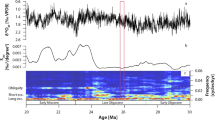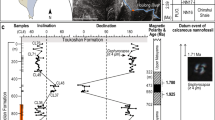Abstract
High abundances of the freshwater diatom Melosira spp., reflecting eolian input from dry lake beds in tropical Africa, occur in deep-sea sediments of the equatorial Atlantic at discrete times during the late Quaternary1,2. We report here an approximately 260 kyr record of Melosira accumulation in an equatorial Atlantic sediment core, and demonstrate significant influence of the Earth's precessional cycle on the climate of tropical Africa.
This is a preview of subscription content, access via your institution
Access options
Subscribe to this journal
Receive 51 print issues and online access
$199.00 per year
only $3.90 per issue
Buy this article
- Purchase on Springer Link
- Instant access to full article PDF
Prices may be subject to local taxes which are calculated during checkout
Similar content being viewed by others
References
Pokras, E. M. & Mix, A. C. Quat. Res. 24, 137–149 (1985).
Stabell, B. Marine Geol. 75, 305–323 (1986).
Katu, A. E. in Saharan Dust: Mobilization, Transport, Deposition (ed. Morales, C.) 95–118 (Wiley, Chichester, 1979).
Prospero, J. M. Spec. Pap. geol. Soc. Am. 186, 71–86 (1981).
Imbrie, J. et al. in Milankovitch and Climate, Part 1 (eds Berger, A. L. et al.) 269–305 (Riedel, Dordrecht, 1984).
Curry, W. B. & Lohmann, G. P. in The Carbon Cycle and Atmospheric CO2: Natural Variations Archean to Present (eds Sunquist, E. T. & Broecker, W. S.) 285–301 (AGU, Washington DC, 1985).
Kutzbach, J. E. & Street-Perrott, F. A. Nature 317, 130–134 (1985).
Jenkins, G. M. & Watts, D. G. Spectral Analysis and its Applications (Holden-Day, San Francisco, 1968).
Berger, A. L. J. atmos. Sci. 35, 2362–2367 (1978).
Bernard, E. A. Acad. R. Sci. Outre-Mer Classe Sci. Nat. Med. Nouvelle Serie XII, Fasc 1, 1–232 (1962).
Kutzbach, J. E. in Variations in the Global Water Budget (eds Street-Perrott, F. A., Beran, M. & Ratcliffe, R. A. S.) 371–389 (Reidel, Dordrecht, 1983).
Rossignol-Strick, M. Palaeogeogr. Palaeoclimatol. Palaeoecol. 49, 237–263 (1985).
Prell, W. L. & Van Campo, E. Nature 323, 526–528 (1986).
Morley, J. J. & Hays, J. D. Earth planet. Sci. Lett. 53, 279–295 (1981).
Talbot, M. R. in The Sahara and the Nile (eds Williams, M. A. J. & Faure, H.) 37–62 (Balkema, Rotterdam, 1980).
Short, D. A. & Mengel, J. G. Nature, 323, 48–50 (1986).
Nicholson, S. E. Nature 296, 779 (1982).
Tetzlaff, G., Wolter, K. & Sarythein, M. Nature 296, 779–780 (1982).
Kutzbach, J. E. & Guetter, P. J. J. atmos. Sci. 43, 1726–1759 (1986).
Author information
Authors and Affiliations
Rights and permissions
About this article
Cite this article
Pokras, E., Mix, A. Earth's precession cycle and Quaternary climatic change in tropical Africa. Nature 326, 486–487 (1987). https://doi.org/10.1038/326486a0
Received:
Accepted:
Published:
Issue Date:
DOI: https://doi.org/10.1038/326486a0
This article is cited by
-
Diverse response of global terrestrial vegetation to astronomical forcing and CO2 during the MIS-11 and MIS-13 interglacials
Climate Dynamics (2023)
-
Responses of global monsoon and seasonal cycle of precipitation to precession and obliquity forcing
Climate Dynamics (2021)
-
Biomass burning history in East Asia during the last 4 million years recorded in elemental carbon variability at IODP site U1423
Progress in Earth and Planetary Science (2018)
-
Paleoenvironmental Reconstruction of Dongodien, Lake Turkana, Kenya and OSL Dating of Site Occupation During Late Holocene Climate Change
African Archaeological Review (2017)
-
Orbital control of the western North Pacific summer monsoon
Climate Dynamics (2016)
Comments
By submitting a comment you agree to abide by our Terms and Community Guidelines. If you find something abusive or that does not comply with our terms or guidelines please flag it as inappropriate.



